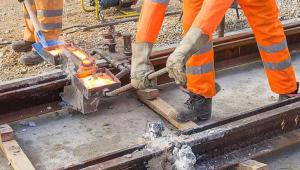1 April 2011
Network Rail’s licence conditions should be changed so that senior management bonuses reflect its regulator’s view of the organisation’s performance, says the National Audit Office.
That is one of the recommendations from the watchdog’s review of how well the Office of Rail Regulation overseas the efficiency of the rail network operator.
Network Rail had already reformed its management bonus system yesterday, following mounting criticism of high payouts, but the NAO’s recommended change would formalise this as part of the regulatory system.
The NAO report Regulating Network Rail'sefficiency, published today, notes that the ORR had ‘found it difficult to reconcile the levels of management bonuses with its own assessment of Network Rail’s performance’.
It adds: ‘The regulator should amend Network Rail’s licence conditions to require it to have regard to the regulator’s assessment of performance when setting management bonuses.’
Network Rail’s new incentive scheme caps the potential annual bonus for executive directors from 2012/13 to 60% of salary, down from 100%. These will be tied to exceeding targets for network condition and train punctuality.
Remuneration committee chair Steve Russell said: ‘The new long-term scheme will only reward sustained performance that exceeds targets and expectations.’
Network Rail will not pay bonuses in 2011/12, following a furore over payments to some former managers.
The NAO report found the efficiency of the not-for-dividend company had improved in absolute terms since it took over from the collapsed Railtrack in 2002, but its relative performance lagged behind the best European rail operations.
Network Rail spent £6.4bn in 2009/10 and made cumulative efficiency savings of 27% in the five years to 2008/09, equivalent to £1.8bn.
This though was less than the 31% the regulator had expected, and Network Rail’s maintenance and renewal work was estimated to be ‘34%–40% less efficient in 2008 than the most efficient level attained by European rail infrastructure managers’. This was the same relative gap as five years earlier.
There were weaknesses in Network Rail’s understanding of unit costs and the regulator should work with it to ‘understand better the reason for the evident efficiency gap’ and for the relatively high infrastructure costs in the UK.
An Office of Rail Regulation spokesperson said: ‘Network Rail still has further to go to close the efficiency gap with its best performing European peers.
‘But as the NAO acknowledge, the regulator has been successful in ensuring that Network Rail delivers substantial efficiency savings on a scale that compares favourably with other regulated industries.’




















